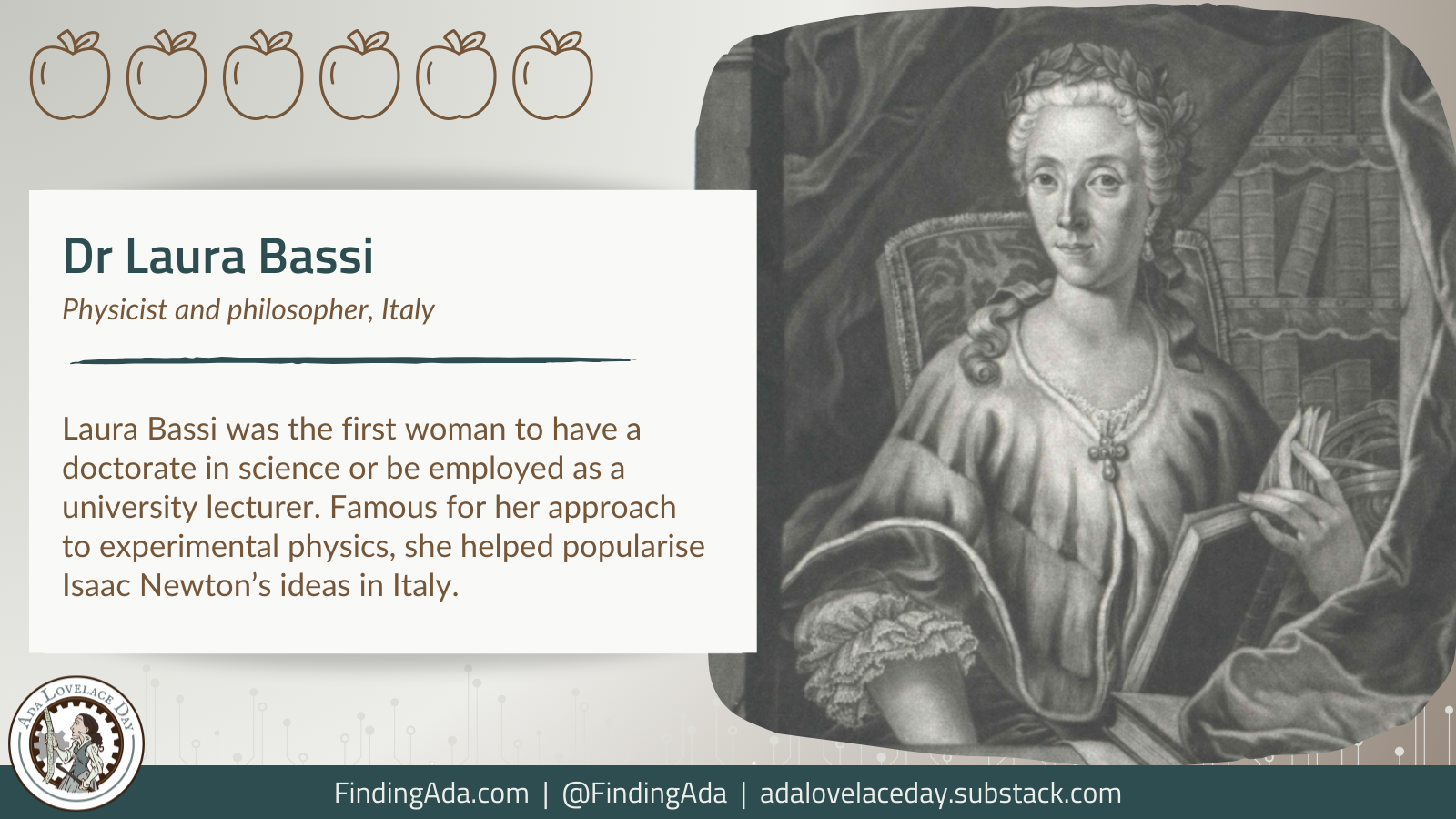Dr Laura Bassi
Laura Bassi Veratti was an 18th century Italian physicist and philosopher who made history as the first woman in the world to have a doctorate in science. She was also the first woman to become a salaried university tutor, and possibly the first woman ever to achieve a fully-fledged scientific career.
Bassi was born in Bologna in 1711 and privately tutored from the age of five. Impressed by her intelligence, Bassi’s family doctor – who was also professor of medicine at the University of Bologna – asked to have a hand in her education, teaching her subjects including philosophy, metaphysics and logic. By the time Bassi was 20, people would visit her home to watch the brilliant young woman debate philosophy and physics with leading male academics.
The Archbishop of Bologna became Bassi’s patron, and arranged for her to publicly defend 49 philosophy theses before professors of the University of Bologna in April 1732. She was promptly awarded a doctorate in natural sciences and philosophy (the second woman to earn a doctorate in philosophy, after Elena Cornaro Piscopia in 1678, as well as the first to have a science doctorate). Bassi was also elected to the Academy of Sciences of the Institute of Bologna, making her the first female member of any Western scientific establishment.
Those weren’t the only big moments for Bassi in 1732. Later that year, she was appointed professor of natural philosophy at the University of Bologna. At 21, not only was she the university’s first female teacher, she was the first paid woman lecturer in the world.
However, while the university was keen to publicise Bassi’s appointment, it was less keen to place her on genuinely equal footing with male academics. She was blocked from teaching ordinary classes and only allowed to lecture publicly at occasional high-profile events. But Bassi had no interest in serving as a ceremonial female figurehead; she wanted to work and teach.
Unusually for the time, Bassi’s marriage helped her pursue her academic and professional ambitions. After she married fellow scientist Giuseppe Veratti in 1738, it was seen as acceptable for her to lecture from her Bologna home (a more controversial activity for a single woman). She started running eight-month courses of daily lessons that combined theoretical and experimental physics in a manner not taught at the University of Bologna.
Bassi was particularly interested in experimenting with electricity, then an exciting new discovery. Students flocked from all over Europe to learn from her. Over time, she gained a reputation as a supporter of the theories of Isaac Newton, and helped introduce Newtonian physics and natural philosophy to Italy.
She authored 28 papers, mostly on physics and hydraulics. While few of Bassi’s works survive today, her influence can be seen in her correspondence with leading scientists and philosophers of her time. Her greatest professional achievement came when she was appointed to the Chair of Experimental Physics by the Bologna Institute of Sciences in 1776. It was her final history-making moment: she was now the first woman in the world to be appointed to a chair of physics at a university.
Bassi died on 20 February 1778 aged 66, having achieved the kind of success as a scientist and academic that many others – men and women alike – could only dream of.
Further Reading
- Laura Bassi, Wikipedia
- Laura Maria Catarina Bassi, MacTutor
- Laura Bassi, Enlightenment Scientist, Emily Zarevich, JStor Daily, 8 January 2023
- Laura Bassi and the city of learning, Paula Findlen, Physics World, 29 August 2013
- Science as a Career in Enlightenment Italy: The Strategies of Laura Bassi, Paula Findlen, Isis, September 1993
Written by Moya Crockett, with thanks to Stylist for their support.
